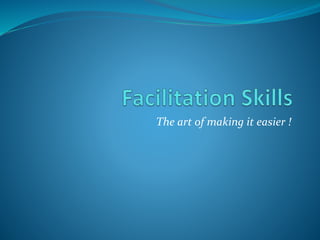
The art of facilitation
- 1. The art of making it easier !
- 2. What’s facilitation ? Designing & implementing an environment in which a group/team can communicate, think about new ideas, develop new skills and share experiences or even make a better meeting with hard decisions.
- 3. Instructors VS. Facilitators Instructor Facilitator Content expert Lecture oriented methods Control what to learn Participant adapts Process manager Engage participants Access prior knowledge Participants share
- 4. A facilitator is : Environ- ment designer A friend A guide by the side Asking more than answerin g Listenin g more than talking Helping them to discover
- 5. ADDIE training design model A = Asses D = Design D = Develop I = Implement E = Evaluate
- 6. 1- Asses Define where they are and what they need Desired skills & knowled ge Current skills & knowledge Training gap
- 7. 2- Design Establish learning objectives. Brainstorm exercises & activities. Draft an outline of the content.
- 8. 3- Develop DEVELOP THE MATERIAL REQUIRED : Participant guide. Facilitator guide. Tests & evaluations. Power point slides. “EVERY ONE HOUR OF THE CLASSROOM TIME NEEDS 10-30 HOURS OF PREPARATION”
- 9. 4- Implement Begin the training workshops !
- 10. 5- Evaluation Reaction Learning Behavior Result
- 12. Notes about activities & methods We can not mention all activities you may use because you will always have your space of creation. It’s the facilitator responsibility to determine what activities, processes or methods to use. Always keep in your mind what you aim to through each activity. Here you are, some of the good methods …
- 13. Brain storming The best to generate new ideas how to use it : Ask a question that can be imagined in mind easily like : “if you were in trouble what is the first thing you may do?” Gather responses without immediate evaluation. Discuss results.
- 14. Case study An excellent way to capitalize on this type of adult learning. Analyze real job-related situations. Let them think about the solution or figure out various ways to see the situation and people.
- 15. Small group discussions Break the participants down into small groups. give them case studies or work situations to discuss or solve. Let every group preset what they have reached together and see what other groups have done.
- 16. Role-playing Helps develop new skills & learn how to face new situations. Design the situation. Determine how roles should be given to participants. Give them short time to prepare. Let them enjoy acting. Discuss the situation after that & how they have feeled.
- 17. Presentation oriented As a facilitator you may not talk too much, but you may also need to act as an instructor in particular parts of your training. That’s all depends on the objective & the participants.
- 19. Facilitator's set of skills Understanding adult learners. Making safe environment. Clarifying objectives. Agenda during the workshop. Making a parking lot. Track conversations. Mirror. Dealing with difficult questions. Managing personalities. The whiner. The 800 pound gorilla.
- 20. 1- Understanding adult learners. Why I need to know My experienc e Involve me Internal motivatio n Problem oriented thinking Relevance to me?
- 21. 2- Making safe environment. Ask for roles which would make them more comforted. Offer some of them by yourself if it’s needed. Remind them with the roles when it’s needed and let them be aware of what is happening and how it may influence their workshop.
- 22. 3- Clarifying objectives. Make it clear. Make it making sense to the group. Validate agreeing and expectations. Be ready to change if it’s needed during the workshop.
- 23. 4- Agenda during the workshop. Review it with the team/group. Visibly track progress during the workshop.
- 24. 5- Making a parking lot. Track issues that requires further actions outside the workshop. Document them. Visit it in the parking lot time.
- 25. 6- track conversations Make sure that every one’s ideas are clear enough to others. Summarize the results from time to time. Make it just one idea to discuss in a time. Always re-arrange the space of ideas spreading in the place.
- 26. 7- Mirror. When someone tells a complex idea, re-express it in front of its teller and ask him ; “Am I understanding you correctly?” When you don’t understand it, simply, ask him to clarify it further.
- 27. 8- Dealing with difficult questions. If it’s irrelevant, delay it to the parking lot. If it’s relevant : Don’t pretend to have all the knowledge in the world or all the solution. Ask for participants’ opinion’s. You may tell them that you will search about it and discuss it again next workshop.
- 28. 9- Managing personalities. The whiner, who disagree all the time. Don’t ignore him. Give him a determined amount of interest. Ask him for the solution. The 800 pound gorilla, who speaks too much. Acknowledge their comment. Offer him to here from other. Ask ; “why don’t we here someone who didn’t talk tell now? ”
